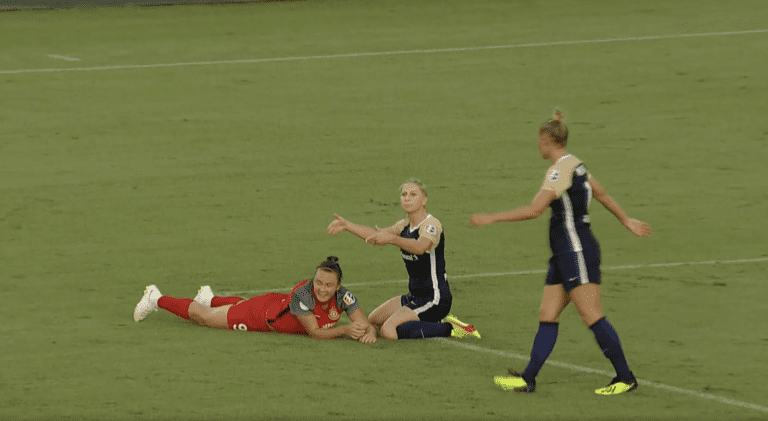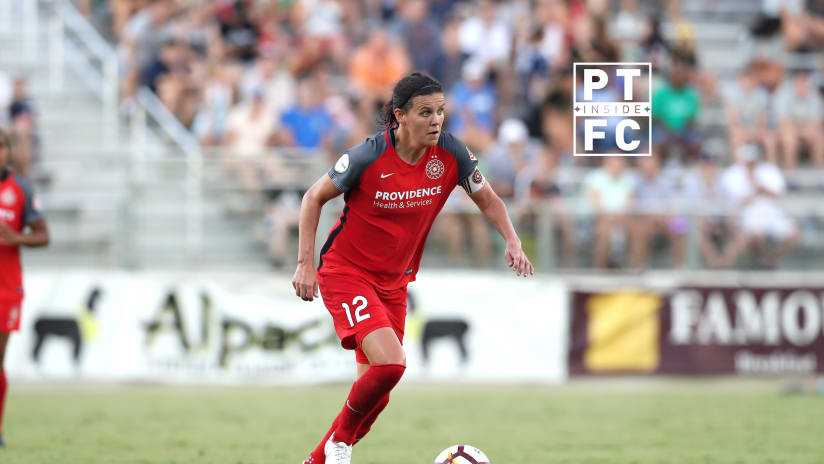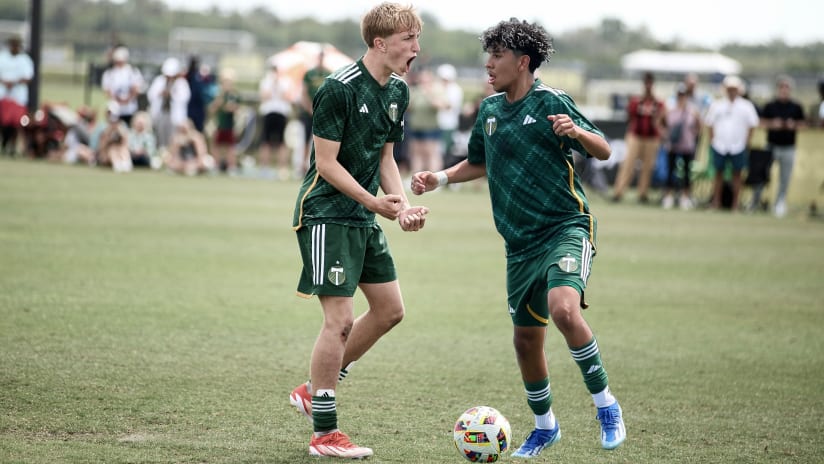I want to know how Paul Riley and Scott Vallow feel, because on one level, Sunday’s game is all they could have reasonably wanted.
The head and assistant coaches for the North Carolina Courage, Riley and Vallow saw their team take a well-earned, 2-1 victory over Portland Thorns FC, the team that prevented them from completing an NWSL Shield-title double in the last season’s championship. The win finished off a three-game, season sweep of the defending champions, and based on a pair of near misses and one first-half non-call, Sunday’s final margin could have been larger.
But I wonder how they’ll feel about the first 35 minutes, where neither team generated a good chance, and the layoffs Portland nearly connected on provided a balance of threat.
Ultimately, Portland never came that close to an equalizer, and in the 31-9 margin in shots taken, there is more than enough evidence to support a view that the Courage were far better. In terms of truly good chances, the home side had four or five (each person’s mileage may vary) while it would be generous to say the visitors had more than a couple. There’s no doubt, the Courage were the superior team, and in the individual performances of players like Denise O’Sullivan, Jessica McDonald, Lynn Williams, Debinha and Samantha Mewis the Courage showed why they’ve risen to the top.
Yet when Riley and Vallow re-watch the game, think about their ultimate goal (a league title) and evaluate the difference between Sunday’s game and the 4-1 thrashing they gave the Thorns on May 30; are they going to be comfortable with a potential title game against the Thorns in Portland? Are they going to be confident that the dominance their team has shown through five-sixths of this season will be there, come the final game of the campaign? Or will they watch these last 90-plus minutes and wonder if the Thorns are getting close enough to, if this season comes down to another 90-minute one-off, give players like Lindsey Horan, Christine Sinclair, Tobin Heath and Adrianna Franch a chance to swipe a result?
Because that’s what happened this weekend. Perhaps it shouldn’t have, but it did, and in a number of factors that were present on Sunday, there’s reason to think the Thorns have solved some of May’s problems.
Boureille and the midfield
We highlighted it the in days after that May result, but legacy of that game will be Portland head coach Mark Parsons taking chances with his approach, and those chances backfiring. Most notably, Parsons set up the Thorns to play Heath and Sinclair high in midfield, rely on Horan to hold down the deeper areas, and set up a dynamic to produce this:
The space in front of the defense, one that a second, holding midfielder would normally be protecting, was left vacated by Parsons changing the shape of his midfield. He tried to exert pressure higher up. It didn’t work, giving North Carolina constant access to that dangerous part of the field.
Since May, Celeste Boureille has slowly been reestablishing her place in the team’s first XI, giving Portland a second player at the base of midfield. Throughout most of the summer, the highest profile result of that change has been Horan’s tactical freedom, paving the way to her July Player of the Month honor. But against the Courage, the biggest impact of Boureille’s reemergence was preventing the side-to-side, attacker-to-attacker midfielder dynamic that undermined the Thorns two-and-a-half months ago.
Whether it was merely steering play wide (as she did in the 21st minute), breakup passes targeting the top of the penalty area (25’), intercepting passes (36’), recovering possession (48’) keeping the ball in the final third (48’, leading to Portland’s goal), or covering for teammates (55’), Boureille was the extra player in midfield the Thorns so sorely lacked in the teams’ last matchup. The GIF, above, may be Sunday’s best example, with a second player in front of the defense able to reclaim possession after O’Sullivan had created a high turnover.
It wasn’t a perfect night for Boureille. Debinha was able to cut in front of the defense, at one point (right before the interception, above), and in the second half, Debinha was able to nutmeg Boureille before playing a cross into the penalty box. But against a North Carolina team that has proven to be one of the NWSL’s all-time bests, perfection is too high of a standard, and within a plan focused on keeping the Courage wide and taking chances with their crosses, Boureille performed very well.
Particularly at WakeMed Park, you’re probably not going to contain the Courage’s talent for 90 minutes, and especially in the moments that Mewis was able to carry the ball from deep midfield into attacking positions, the Thorns midfield had trouble keeping up. But compared to May, the progress was enormous. And it was enormous in large part because of Boureille’s role.
Adrianna Franch was back, this time
There are multiple teams in the NWSL for whom Britt Eckerstorm, Portland’s backup goalkeeper, would be an upgrade in the starting XI, but unfortunately for the former Penn State Nittany Lion, she just happens to be on the same team as the best goalkeeper in U.S. soccer. On Sunday, Franch showed why the difference between her and her teammate (who played in the May game) could prove a key factor if the Thorns face the Courage once more.
On both North Carolina goals, Franch was left in near-impossible positions, but the hosts’ halftime lead would have been larger were it not for the `keeper’s quick reflects in stopping a close-range, 41st minute deflection from McCall Zerboni.
On that play, just as she did in the 65th minute, when she came up big on a Mewis shot, Franch got up quickly and put herself in position to contest the rebound. Both times, North Carolina was prevented from adding to their lead, just as they were in the 70th minute, when Franch’s positioning left her in the perfect spot to catch Abby Erceg’s header from six yards out.
“AD Franch, holy [cow],” Parsons said in the minutes after Sunday’s match. “Someone can drive the bandwagon, I’ll be up front for however long we need to drive. World class. Straight back in. Hasn’t played in over three weeks. Not much training because of the rhythm of the [Tournament of Nations], then she plays like that. Distribution was outstanding. Her hands in goal were fantastic. Dominant with crosses. Just continues to prove she’s the best in the league.”
The chances Franch stopped are part of the reason why many will see the Courage as having dominated Sunday’s game, and in a sense, those people aren’t wrong. Goalkeepers defy tactics, one-on-one battles, or chances created, and as such, are often left out of the final calculus when run of play is discussed.
But the Thorns do have Adrianna Franch, and in all likelihood, they will have her come the postseason, should the team get there. Unless Franch suddenly becomes a normal goalkeeper, she’ll be a huge part of a potential title showdown.
Composure + Physicality = Show of Mentality
No matter who faces North Carolina in the postseason, composure is going to be key to maintaining any chance to upset them. To opponents, the speed and physicality of the Courage can feel unrelenting, with any moment of lost focus potentially sparking an avalanche of goals.
The Thorns experienced that in May when they conceded the second, third and fourth goals of the game within a span of seven minutes. A similar landslide nearly undermined Sunday’s game, with both of North Carolina’s goals coming with eight minutes of the halftime whistle. But in between those scores, the Thorns were able to deal with any momentum the Courage threatened to muster, reestablishing their place in the game within five minutes of Carolina’s 37th-minute opener. Only a defensive breakdown on what should have been an innocuous, 45th minute clearance allowed the home side to double their lead before intermission.
Unlike the May 30 game, though, the Thorns stayed within striking distance, and come the end of the game, the somewhat even-footing that characterized much of the first half had been restored. The Courage were still racking up low-impact shots. The Thorns were still trying to play an extra ball. It was the Carolina-Portland dynamic we’ve all come to know and love.
Part of that, though, was the exasperated look on Zerboni’s face amid the physicality of the battle.

Under normal circumstances, the intensity of players like Zerboni, as well as O’Sullivan, fullback Merritt Mathias and others, leaves other teams overmatched. To the chagrin of many in the league, the Thorns are able to match the Courage blow for blow, with the strength of players like Horan, Sinclair, Emily Sonnett and, now, Caitlin Foord able to equalize one of North Carolina’s greatest advantages.
To the Courage’s frustration, the Thorns carried that fight well into the second half, and while that fight didn’t translate to the scoreboard, it was emblematic of what the rivalry between the squads has become. It’s part of what makes that 4-1 win in May so remarkable – that one side could do that to the other – and, ultimately, it is a dynamic that might cast that blowout as aberrational.
Even on a day when North Carolina got a number of strong individual performances and showed why they may be the best team the NWSL’s ever known, they still left that field, their home field, only one goal up on the Thorns. And within those 90 minutes that clinched the Courage’s second trophy in as many years, there were reasons to think that, should the teams meet for a fourth time come September, the result could be even closer.














